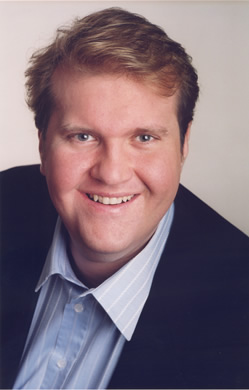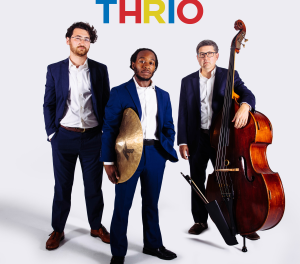The final concert of the fifty-first season of the Eastern Music Festival was like a special gift to the community which has so generously and enthusiastically supported this magnificent program for half a century. This was a night to remember as both the length and breadth of this concert was unprecedented, leaving the audience with a “WOW!” experience that was through the roof.
The appetizer before the two major works was “Across the Span of Time,” by New York City born and current resident Richard Danielpour. This was one of eighteen commissions written in honor of Gerard Schwarz’s final season in 2010/11 as Music Director of the Seattle Symphony. Conducting the Festival Orchestra here was the recipient of those numerous honors, and Music Director of the EMF; this was a particularly personal honor for Schwarz. This was essentially a dialogue between two trumpet players; one standing in the orchestra and the other in the balcony of Dana Auditorium. Maestro Schwarz, trumpet, was the youngest principal player in the history of the New York Philharmonic so this is an homage to his incredible accomplishments, then and now. Written in a spacious, evocative style that immediately drew you in, this was a perfect introduction to the angst of Mahler waiting in the wings.
During the years 1907-08 Gustav Mahler was dealt a hand of triple misfortune: he was dismissed from his post as director of the Vienna Opera, his beloved daughter Maria died from scarlet fever, and Mahler was diagnosed with a serious heart condition that would eventually lead to his death in 1911. These events combined with the likelihood that he was certainly aware of his wife Alma’s unfaithful behavior, would make anyone look on the dark side of life. It was amid this tearing apart of his personal foundation that Mahler wrote Das Lied von der Erde (The Song of the Earth). Written to a German translation of several Chinese poems – with some textual additions by Mahler himself – this is a six-movement work for large orchestra with tenor and alto (or baritone) soloist. Despite this being symphonic in stature and the fact that several previous symphonies had vocal soloists, Mahler refused to label this a “symphony” which would have been his ninth, hoping to evade the so-called “Ninth Symphony curse.”
This performance featured tenor soloist Anthony Dean Griffey and mezzo-soprano Nancy Maultsby in a monumental 65-minute traversal of nature, love, the pleasures of drink, and finally, resignation to the hardships of life and grudging acceptance of death. The first movement, “Das Trinklied von jammer der Erde” (The Drinking Song of Earth’s Misery) lays out the general idea of the entire work with the repeated refrain, “Dark is life, is death.” Tenor Griffey was powerful and emotive as his piercing voice was heard above the large orchestral voices, with clear diction and perfect pronunciation (according to my German wife!)
Although the vocal soloists are front and center during much of the work, the parts for each section of the orchestra are infused with that unmistakable “Mahler sound” most notably sections where ridiculously complex birdcalls arise from the woodwinds. An interesting addition to the concert was a translation of the text portrayed on the back sound shells, something that is now commonplace in Opera but I have previously not seen in a symphonic work with vocal soloists.
I am not an Historically Informed Performance HIPster by any means, and I understand the need for heavy vibrato, where/when appropriate, but Nancy Maultsby’s exclusive use throughout her solos of an excessively wide and fast vibrato was a distraction to this listener. Considering her experience with ensembles like Boston Baroque, it would have added to the meaning of the text and increased the aural variety if we could have heard at least a few straight pitches.
The final movement, “Der Abschied” (The Farewell) is nearly as long as the five other movements combined and is a lament to the physical world and all its tribulations. The long orchestral interlude leads into the dying words of “Forever…forever.” It is no surprise that even Mahler was so worried about the extreme morbidity of this piece that he asked, “won’t people go home and shoot themselves?”
It seems like musical blasphemy to follow this epic work with anything, but all it took was just a few measures of the opening of Jean Sibelius’ Symphony No. 2 in D to, believe it or not, say “Gustav who?” I’m going to go right out to the farthest edge of the limb and say that this goes right into my five greatest performances of all time. Maestro Schwarz seemed to have a special affinity for this highly praised, but sporadically played symphony as his passion and intimate involvement was palpable.
Written in 1902, this was the last of his 4-movement symphonies as his later works became more concise and compact. The simplicity of the opening motif, played with great depth and body by the strings, belies the transformations to come. Schwarz elicited a sense of phrasing that gave this performance a living presence. There was so much beauty and superb playing throughout but the best was saved for last. A slow buildup at the beginning of the last movement starts us on an impeccably controlled climb that breaks forth as the third is ratcheted up a half-step to the glorious finale in the major key. When something as perfect as this happens, speech eludes you and you just resort to a guttural WOW!












